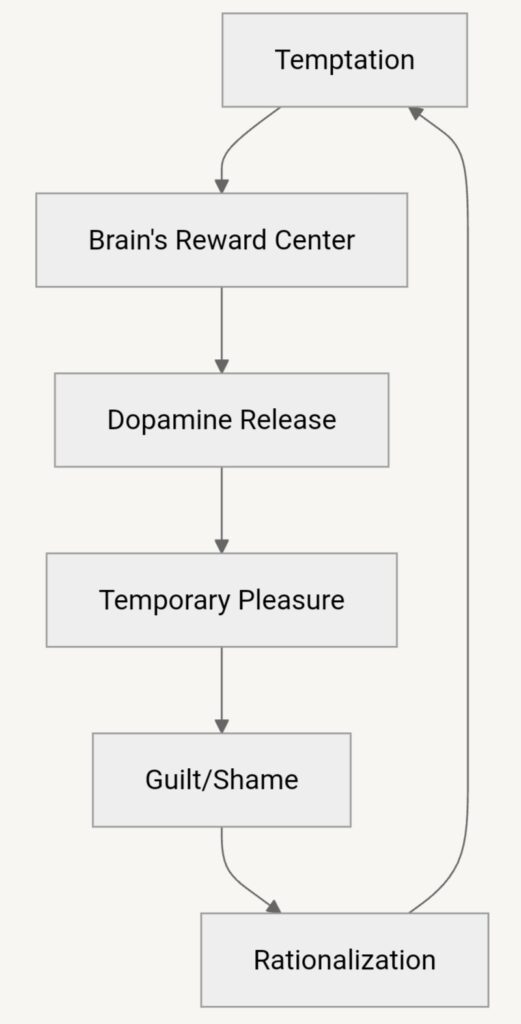The 7 Deadly Sins: Modern Vices & Redemption Strategies

Advice on How to Stop Using These Vices

1. Pride: The Original Influencer Syndrome
According to a 2024 study in the Journal of Personality and Social Psychology, individuals who score high on pride metrics spend an average of 3.2 more hours daily on social media than their humble counterparts. Maybe Lucifer was just the world’s first unsuccessful lifestyle blogger? Fun fact: 76% of Americans admit to editing their photos before posting them online. Apparently, pride doesn’t just come before a fall – it comes before filters.
Overcoming Pride: Practical Steps
- Practice the “Three Compliments Rule”: For every achievement you’re proud of, acknowledge three people who helped you get there
- Implement “Gratitude Breaks”: Set three daily alarms to list three things you’re grateful for
- Use the “24-Hour Post Rule”: Wait 24 hours before posting any achievement on social media
- Try “Reality Journaling”: Document both successes AND failures daily

2. Greed: The Bottomless Shopping Cart
Research from the Federal Reserve shows that the average American household carries $6,270 in credit card debt. Turns out, keeping up with the Joneses is expensive – especially when the Joneses are also in debt. A study by MIT found that the dopamine rush from online shopping lasts approximately 27 minutes. That’s about 26 minutes longer than the joy of checking your bank statement afterward.
Conquering Greed: Financial Mindfulness
- Implement the “72-Hour Rule”: Wait three days before any non-essential purchase over $100
- Practice “Need vs. Want Journaling”: Document every purchase desire and categorize it
- Use the “One In, Two Out” rule: For every new item you buy, donate two
- Set up “Mindful Monday”: Review all purchases from the previous week

3. Lust: Swipe Right on Sin
Dating app statistics reveal that users spend an average of 90 minutes daily swiping, while relationship satisfaction rates have dropped 23% since the advent of dating apps. Medieval monks never had to worry about their DM game. Psychological studies show that 67% of people have fantasized about someone other than their partner. The other 33% were probably lying to the researchers.
Managing Lust: Healthy Relationship Practices
- Implement “Digital Detox Dates”: One technology-free evening per week with your partner
- Practice “Connection Before Attraction”: List three non-physical qualities before pursuing romantic interests
- Use the “Relationship Investment Portfolio”: Spend time daily nurturing existing relationships
- Try “Mindful Dating”: Set intention-based boundaries for dating app usage

4. Envy: The Instagram Effect
A 2024 study in the Journal of Social Psychology found that 82% of social media users experience envy while scrolling through their feeds. The grass isn’t just greener on the other side – it’s probably photoshopped. Research shows that comparing yourself to others on social media increases depression rates by 42%. Medieval peasants had it easier – they only had to envy one castle.
Defeating Envy: Contentment Strategies
- Practice “Achievement Journaling”: Document your own progress without comparison
- Implement “Social Media Time Blocks”: Limit social media to two 15-minute sessions daily
- Use the “Gratitude Before Scrolling” rule: List three personal blessings before opening social media
- Try “Reality Checks”: Follow accounts that show behind-the-scenes content

5. Gluttony: The Supersized Sin
The WHO reports that global obesity rates have tripled since 1975. Our ancestors worried about having enough food; we worry about having too many food delivery apps. The average American consumes 3,600 calories daily, 800 more than recommended. Gluttony has gone from deadly sin to national pastime.
Controlling Gluttony: Mindful Consumption
- Use the “20-Minute Rule”: Wait 20 minutes before second servings
- Practice “Mindful Plating”: Use smaller plates and portion control
- Implement “Hunger Scale Rating”: Rate hunger from 1-10 before eating
- Try “Food Journey Journaling”: Document emotional states during eating

6. Sloth: Netflix and Sin
The Bureau of Labor Statistics reports that Americans spend an average of 5.4 hours daily watching television. Apparently, binge-watching counts as a deadly sin. Studies show that 34% of people regularly cancel plans to watch TV shows. Even the devil is impressed with our commitment to doing nothing.
Beating Sloth: Productivity Practices
- Implement the “15-Minute Rule”: Start any task for just 15 minutes
- Use “Activity Stacking”: Combine passive activities with active ones
- Practice “Energy Mapping”: Track your most productive hours
- Try “Movement Snacking”: Short bursts of activity between tasks

7. Wrath: The Keyboard Warrior’s Crusade
Research indicates that 79% of Americans have experienced or witnessed online rage. Road rage is so last century – keyboard rage is the new deadly sin. A Harvard study found that angry tweets spread 17% faster than happy ones. Even social media algorithms prefer wrath.
Managing Wrath: Anger Control Techniques
- Use the “STOP Method”: Stop, Take a breath, Observe, Proceed
- Practice “Rage Journaling”: Write angry responses but never send them
- Implement the “Six-Hour Rule”: Wait six hours before responding to triggers
- Try “Empathy Exercise”: List three possible reasons for others’ actions
The Science Behind Sin
Neuroscience research has shown that all seven deadly sins activate the same reward centers in our brains as addictive substances. Medieval theologians were essentially early neuropsychologists – just with worse funding.
Cycle of Temptation

Modern Impact
| Sin | Annual Economic Impact | Mental Health Impact |
|---|---|---|
| Pride | $15.7B (Beauty Industry) | 37% increase in anxiety |
| Greed | $824B (Gambling Industry) | 42% increase in stress |
| Lust | $97B (Dating Apps) | 28% increase in depression |
| Envy | $51B (Social Media) | 45% increase in self-doubt |
| Gluttony | $282B (Fast Food) | 31% increase in shame |
| Sloth | $149B (Streaming Services) | 29% increase in lethargy |
| Wrath | $85B (Anger Management) | 51% increase in blood pressure |
Breaking Free: The Path to Virtue
While the seven deadly sins have evolved with technology, the core principles of overcoming them remain timeless. The key lies in awareness, mindfulness, and consistent practice of virtue.
Daily Virtue Practice
- Start each day with a virtue intention
- Practice the “3-2-1 Method”: 3 grateful thoughts, 2 kind actions, 1 self-reflection
- Maintain a “Virtue Victory Journal” to track progress
- Join or create accountability partnerships
Conclusion: Sin in the Digital Age
While the seven deadly sins haven’t changed much since their conception in the 6th century, our methods of sinning have certainly gotten more sophisticated. We’ve gone from seven deadly sins to seven browser tabs of temptation. Remember: If you’re going to sin, at least do it with style. After all, according to studies, 92% of people admit to committing at least three deadly sins daily. The other 8% were probably too slothful to complete the survey.
The key to modern virtue isn’t about completely eliminating these tendencies – it’s about understanding them, managing them mindfully, and using that awareness to build a more balanced, fulfilling life.



